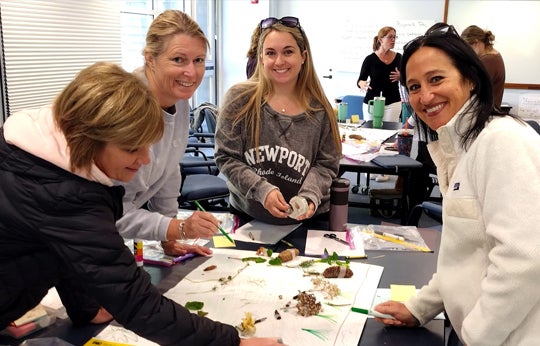Starting in fall 2024, URI’s Feinstein College of Education will offer a new Bachelor of Science degree in environmental education, geared toward active learners who are passionate about the environment and want to promote awareness and stewardship in the community, leading new generations toward a more sustainable future.
The program will prepare students for professional careers in education settings, such as nature centers, zoos, aquariums, parks, as well as local, state, and federal agencies, and political action groups.
Developed by Sara Sweetman, associate professor of elementary and environmental education, the program works across three pillars: interdisciplinary environmental knowledge; community-based teaching and learning strategies/ program development; and environmental justice and advocacy.
URI’s program is the first at an institution of higher education in New England. Currently, there are only a few such undergraduate programs in the country.
Along with developing an understanding of environmental issues and teaching strategies, students will explore the influences of socio-economic and cultural identity on access to healthy environments, and will learn strategies to improve environmental injustices faced by historically underrepresented populations.
The program was designed in partnership with the Rhode Island Environmental Education Association. Students will gain real-life experiences with member organizations, including Roger Williams Park Zoo, Mystic Aquarium, Audubon Society of Rhode Island, Rhode Island Department of Management and Save the Bay.
Additionally, students will learn the beliefs, traditions, and teaching methods of the Niantic People who occupy the traditional land and territories of the Narragansett Nation, on which the University of Rhode Island is located.
“The environmental education program will intentionally break traditional teaching methods by using the forests, coastlines, and other natural and designed environments as classrooms,” said Sweetman. “The high-impact, place-based instruction has the potential to attract and retain a more diverse student population and may provide a model and tools for other programs to move toward flexible use of classroom space.”
Sweetman said that this interdisciplinary knowledge will help students effectively participate in solving local and global challenges associated with climate change and other environmental impacts to increase access to healthy environments.
“An environmental education degree program is just what Rhode Island needs to meet the changing and urgent demands of our state,” said Jeanine Silversmith, executive director of the Rhode Island Environmental Education Association.
She added that environmental activists are constantly seeking qualified environmental educators to embrace the growing green and blue economies, address environmental challenges, and become civically engaged with climate and environmental policies.
Sweetman said the program will contribute to the “broad and deep impacts on social, cultural and economic ecosystems across Rhode Island, the nation and beyond.”

